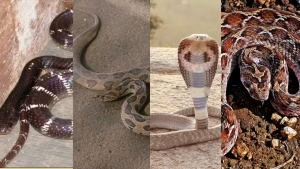PRELIMS BITS

Context
- A study titled “Future of Snakebite Risk in India” highlights climate-driven shifts in the distribution of India’s Big Four snakes.
About India’s Big Four Snakes
- Species: Common Krait, Russell’s Viper, Saw-scaled Viper, Spectacled Cobra.
- Significance: Responsible for ~90% of snakebite cases in India.
- Fatalities: High mortality due to shortage of effective antivenoms.
- India’s Burden: Records ~58,000 snakebite deaths annually, nearly half of global deaths, making it the worst-affected country worldwide.
Species Profiles
- Common Krait (Bungarus caeruleus)
- Feature: Slender, nocturnal; neurotoxic venom → respiratory paralysis.
- Habitat: Grasslands, crop fields, scrublands, village edges.
- Range: Indian plains and river valleys; absent in Himalayas.
- Status: IUCN – Least Concern; WPA – Schedule IV.
- Russell’s Viper (Daboia russelii)
- Feature: Heavy-bodied; hemotoxic venom → coagulopathy, kidney failure.
- Habitat: Farmlands, scrub jungles, grasslands, sugarcane/paddy belts.
- Range: Indian lowlands; absent in dense forests & high altitudes.
- Status: IUCN – Least Concern; WPA – Schedule II (Part II).
- Saw-scaled Viper (Echis carinatus)
- Feature: Small, aggressive; produces “sizzling” warning sound.
- Habitat: Deserts, rocky plains, dry scrub, thorn forests.
- Range: Arid western India, Deccan plateau, semi-arid zones.
- Status: IUCN – Least Concern; WPA – Schedule IV.
- Spectacled Cobra (Naja naja)
- Feature: Hooded snake with spectacle mark; culturally revered.
- Habitat: Forests, wetlands, agricultural fields, peri-urban areas.
- Range: Widely distributed in plains; scarce in Himalayas & deserts.
- Status: IUCN – Least Concern; WPA – Schedule II (Part II); CITES – Appendix II.
Key Findings of the Study
- Range Shift: Southern habitats shrink as ranges move northwards.
- New Gains: Suitable habitats expand in Haryana, Rajasthan, Assam.
- Northeast Expansion: Habitat suitability may increase by over 100% in Northeastern states.




